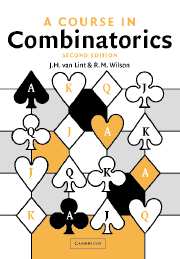Book contents
- Frontmatter
- Contents
- Preface to the first edition
- Preface to the second edition
- 1 Graphs
- 2 Trees
- 3 Colorings of graphs and Ramsey's theorem
- 4 Turán's theorem and extremal graphs
- 5 Systems of distinct representatives
- 6 Dilworth's theorem and extremal set theory
- 7 Flows in networks
- 8 De Bruijn sequences
- 9 Two (0, 1, ⋆) problems: addressing for graphs and a hash-coding scheme
- 10 The principle of inclusion and exclusion; inversion formulae
- 11 Permanents
- 12 The Van der Waerden conjecture
- 13 Elementary counting; Stirling numbers
- 14 Recursions and generating functions
- 15 Partitions
- 16 (0, 1)-Matrices
- 17 Latin squares
- 18 Hadamard matrices, Reed–Muller codes
- 19 Designs
- 20 Codes and designs
- 21 Strongly regular graphs and partial geometries
- 22 Orthogonal Latin squares
- 23 Projective and combinatorial geometries
- 24 Gaussian numbers and q-analogues
- 25 Lattices and Möbius inversion
- 26 Combinatorial designs and projective geometries
- 27 Difference sets and automorphisms
- 28 Difference sets and the group ring
- 29 Codes and symmetric designs
- 30 Association schemes
- 31 (More) algebraic techniques in graph theory
- 32 Graph connectivity
- 33 Planarity and coloring
- 34 Whitney Duality
- 35 Embeddings of graphs on surfaces
- 36 Electrical networks and squared squares
- 37 Pólya theory of counting
- 38 Baranyai's theorem
- Appendix 1 Hints and comments on problems
- Appendix 2 Formal power series
- Name Index
- Subject Index
6 - Dilworth's theorem and extremal set theory
Published online by Cambridge University Press: 05 June 2012
- Frontmatter
- Contents
- Preface to the first edition
- Preface to the second edition
- 1 Graphs
- 2 Trees
- 3 Colorings of graphs and Ramsey's theorem
- 4 Turán's theorem and extremal graphs
- 5 Systems of distinct representatives
- 6 Dilworth's theorem and extremal set theory
- 7 Flows in networks
- 8 De Bruijn sequences
- 9 Two (0, 1, ⋆) problems: addressing for graphs and a hash-coding scheme
- 10 The principle of inclusion and exclusion; inversion formulae
- 11 Permanents
- 12 The Van der Waerden conjecture
- 13 Elementary counting; Stirling numbers
- 14 Recursions and generating functions
- 15 Partitions
- 16 (0, 1)-Matrices
- 17 Latin squares
- 18 Hadamard matrices, Reed–Muller codes
- 19 Designs
- 20 Codes and designs
- 21 Strongly regular graphs and partial geometries
- 22 Orthogonal Latin squares
- 23 Projective and combinatorial geometries
- 24 Gaussian numbers and q-analogues
- 25 Lattices and Möbius inversion
- 26 Combinatorial designs and projective geometries
- 27 Difference sets and automorphisms
- 28 Difference sets and the group ring
- 29 Codes and symmetric designs
- 30 Association schemes
- 31 (More) algebraic techniques in graph theory
- 32 Graph connectivity
- 33 Planarity and coloring
- 34 Whitney Duality
- 35 Embeddings of graphs on surfaces
- 36 Electrical networks and squared squares
- 37 Pólya theory of counting
- 38 Baranyai's theorem
- Appendix 1 Hints and comments on problems
- Appendix 2 Formal power series
- Name Index
- Subject Index
Summary
A partially ordered set (also poset) is a set S with a binary relation ≤ (sometimes ⊆ is used) such that:
(i) a ≤ a for all a ∈ S (reflexivity),
(ii) if a ≤ b and b ≤ a then a ≤ c (transitivity),
(iii) if a ≤ b and b ≤ a then a = b (antisymmetry).
If for any a and b in S, either a ≤ b or b ≤ a, then the partial order is called a total order, or a linear order. If a ≤ b and a ≠ b, then we also write a < b. Examples of posets include the integers with the usual order or the subsets of a set, ordered by inclusion. If a subset of S is totally ordered, it is called a chain. An antichain is a set of elements that are pairwise incomparable.
The following theorem is due to R. Dilworth (1950). This proof is due to H. Tverberg (1967).
Theorem 6.1.Let P be a partially ordered finite set. The minimum number m of disjoint chains which together contain all elements of P is equal to the maximum number M of elements in an antichain of P.
Proof: (i) It is trivial that m ≥ M.
(ii) We use induction on |P|. If |P| = 0, there is nothing to prove. Let C be a maximal chain in P. If every antichain in P\C contains at most M – 1 elements, we are done. So assume that {a1,…, aM} is an antichain in P\C.
- Type
- Chapter
- Information
- A Course in Combinatorics , pp. 53 - 60Publisher: Cambridge University PressPrint publication year: 2001



